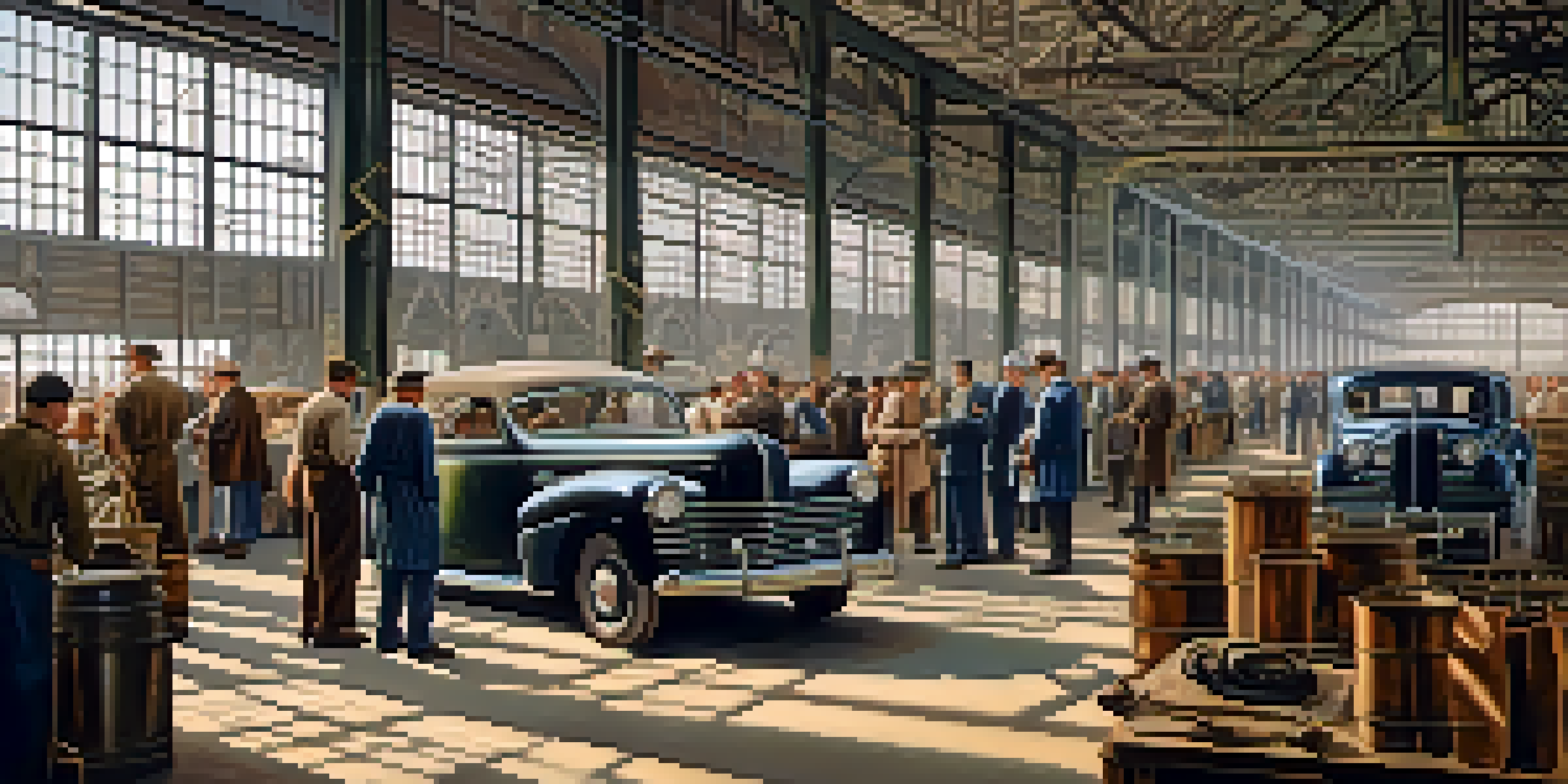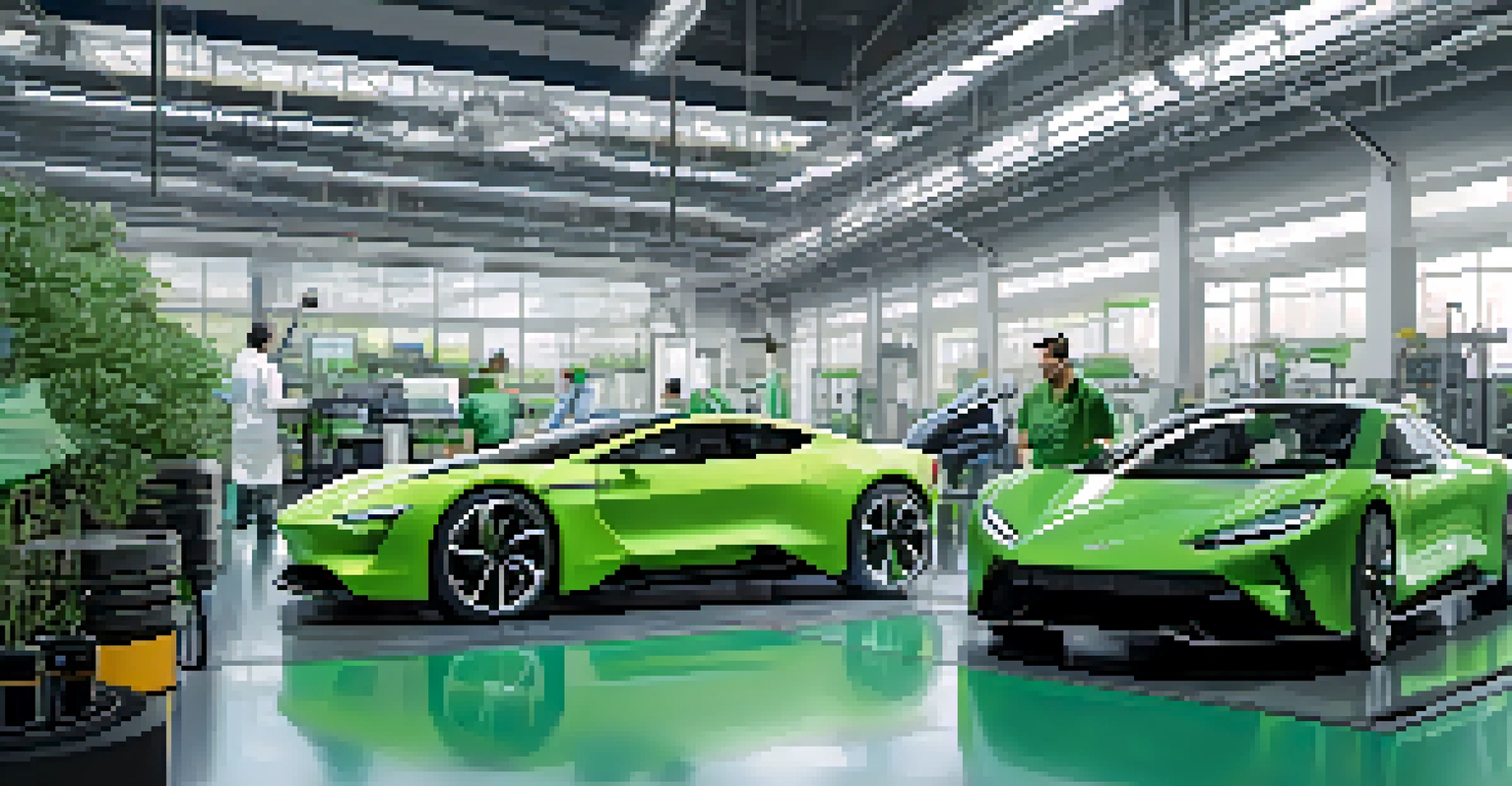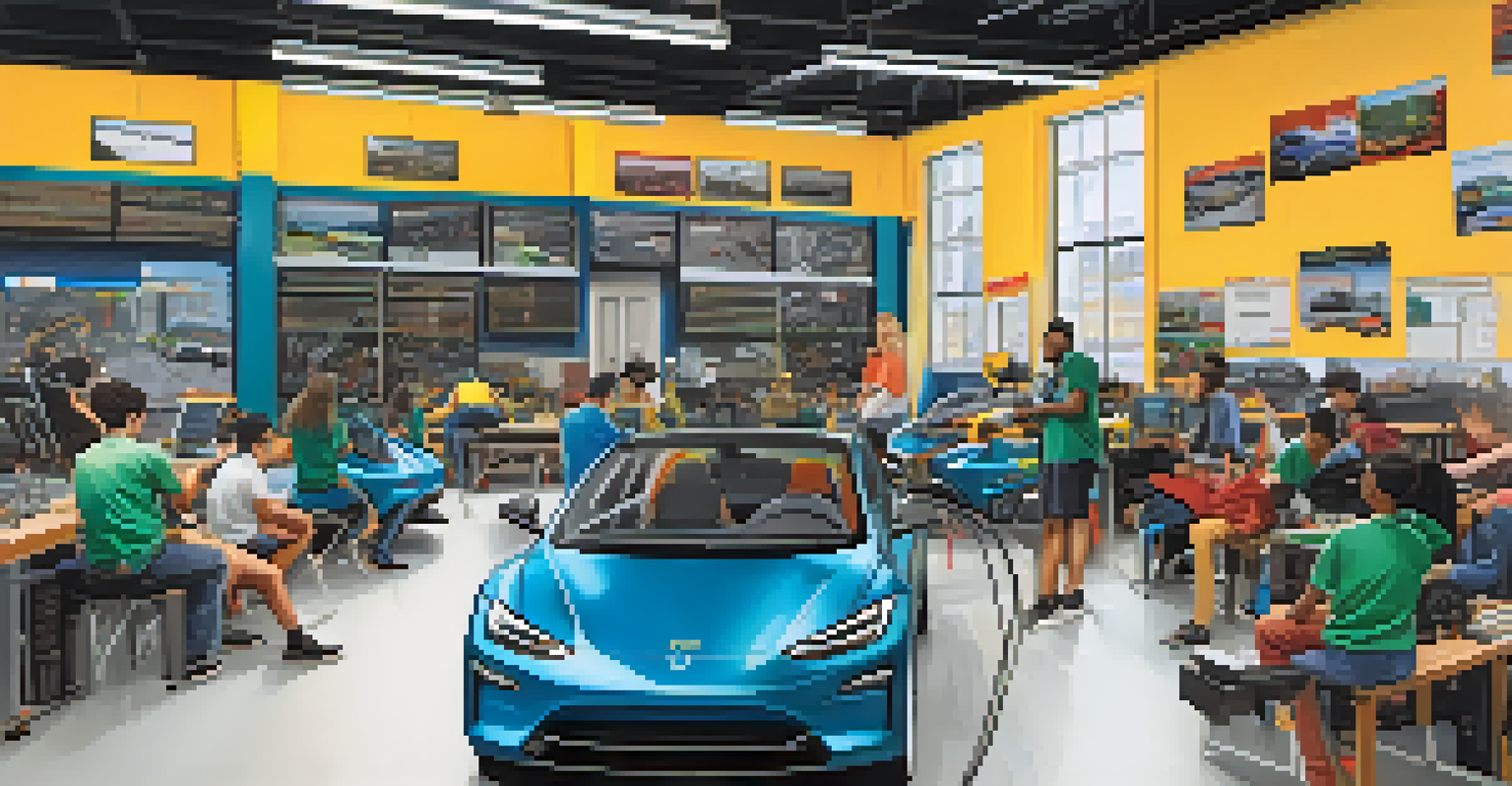Detroit’s Automotive Workforce: Past, Present, and Future

The Rise of Detroit as the Auto Capital in the Early 20th Century
In the early 1900s, Detroit transformed into the heart of the automotive industry, earning its nickname as the 'Motor City.' This evolution was fueled by the innovative assembly line introduced by Henry Ford, which revolutionized car production. As factories sprung up across the city, thousands of job opportunities emerged, attracting a diverse workforce eager to partake in this booming industry.
The only way to do great work is to love what you do.
Detroit's automotive boom not only provided jobs but also spurred economic growth, leading to the establishment of a robust middle class. The city became a melting pot of cultures as people from various backgrounds arrived in search of work. This vibrant mix contributed to a unique community identity, centered around the pride of automobile manufacturing.
However, this golden era was not without its challenges. The rapid industrial growth brought about labor disputes, as workers sought better wages and safer working conditions. These struggles helped shape labor rights movements, laying the groundwork for future negotiations between labor unions and automotive companies.
The Impact of Globalization on Detroit's Auto Industry
As the world became more interconnected, globalization significantly impacted Detroit's automotive workforce. In the late 20th century, American automakers faced fierce competition from foreign manufacturers, leading to a shift in production strategies. Companies began outsourcing jobs to countries where labor costs were lower, causing a decline in local employment opportunities.

This outsourcing trend created a ripple effect, resulting in factory closures and job losses within Detroit. Communities that once thrived on automotive manufacturing faced economic downturns, leading to population declines and urban blight. Many skilled workers found themselves searching for new careers outside the industry, shifting the workforce landscape drastically.
Detroit's Shift to Electric Vehicles
The automotive industry's transition to electric vehicles is reshaping job requirements and creating opportunities for skills development.
Despite these challenges, globalization also opened doors for new opportunities. Detroit began attracting international automotive companies looking to tap into the region's rich automotive heritage and skilled labor force. This shift has led to the emergence of new job sectors, focusing on advanced technologies and electric vehicles, signaling a transformation in the industry.
The Role of Technology in Shaping the Current Workforce
Today, technology plays a pivotal role in reshaping Detroit's automotive workforce. The rise of automation and artificial intelligence has transformed traditional manufacturing processes, requiring a workforce that is adaptable and technologically savvy. As vehicles become smarter, the need for skilled workers in software development and engineering has surged.
Innovation distinguishes between a leader and a follower.
This shift means that many current automotive jobs are evolving, with a greater emphasis on technical skills. Workers are now required to engage with complex machinery and software systems, necessitating ongoing education and training. Local educational institutions have responded by partnering with automotive companies to create specialized programs that prepare students for these emerging roles.
Moreover, the integration of technology is not just changing the types of jobs available; it is also enhancing productivity and safety within the industry. As Detroit embraces these advancements, the workforce is learning to navigate new tools and techniques, ultimately fostering innovation that can lead to a brighter future for the automotive sector.
The Shift Towards Electric Vehicles and Its Implications
The automotive industry is currently undergoing a significant transition towards electric vehicles (EVs), which is poised to redefine Detroit's workforce landscape. Major automakers are investing heavily in EV technology, requiring a new set of skills and expertise. This shift represents both a challenge and an opportunity for the workforce as traditional manufacturing methods give way to new practices.
As the demand for electric vehicles increases, workers will need to adapt to changes in design, production, and maintenance. This means that training and upskilling will be crucial for existing employees to stay relevant in the evolving automotive landscape. Programs aimed at teaching electric vehicle technologies and sustainable practices are becoming essential to ensure the workforce is prepared.
Diversity Drives Innovation
Emphasizing diversity and inclusion within the automotive workforce enhances creativity and problem-solving, benefiting both companies and the local economy.
Additionally, this transition can lead to job creation in emerging sectors such as battery production and renewable energy integration. Detroit has the potential to become a leader in the green automotive movement, attracting new talent and investment. By embracing this change, the city can revitalize its workforce and economy, paving the way for a sustainable future.
The Importance of Diversity and Inclusion in the Workforce
As Detroit's automotive workforce evolves, the importance of diversity and inclusion has come to the forefront. A diverse workforce brings a wealth of perspectives and ideas, which can drive innovation and creativity in the industry. Automakers are increasingly recognizing that fostering an inclusive environment can enhance problem-solving and customer engagement.
Efforts to promote diversity have led to initiatives aimed at recruiting underrepresented groups in engineering and manufacturing roles. Programs designed to support women and minorities in the automotive field are gaining traction, ensuring that the workforce reflects the community it serves. This commitment to inclusion not only benefits companies but also strengthens the local economy.
Moreover, creating a culture of inclusivity can improve employee satisfaction and retention rates. When workers feel valued and respected, they are more likely to contribute positively to their organizations. As Detroit continues to rebuild its automotive workforce, embracing diversity will be key to its long-term success.
Challenges Facing the Automotive Workforce Today
Despite the advancements and opportunities within Detroit's automotive sector, challenges remain for the workforce. The transition to electric vehicles and automation has created uncertainty for many workers accustomed to traditional roles. The fear of job displacement looms large, highlighting the need for comprehensive retraining programs to help employees navigate this shifting landscape.
Additionally, the COVID-19 pandemic has exacerbated existing issues, leading to supply chain disruptions and temporary layoffs. Many workers have faced financial instability, prompting discussions about the need for stronger safety nets and support systems within the industry. As the pandemic effects linger, addressing these challenges is crucial for workforce recovery.
Challenges in Workforce Adaptation
The shift towards automation and EVs presents uncertainties for workers, highlighting the need for retraining and support systems to ensure job security.
Furthermore, competition for talent is intensifying as companies vie for skilled workers in a rapidly changing market. Detroit must not only attract new talent but also retain its existing workforce by providing opportunities for growth and advancement. Meeting these challenges head-on will determine the future viability of the automotive industry in Detroit.
Looking Ahead: The Future of Detroit's Automotive Workforce
Looking to the future, Detroit's automotive workforce is at a pivotal crossroads. The ongoing evolution toward electric vehicles and advanced technologies presents both challenges and immense opportunities for growth. By investing in education, training, and innovation, the city can position itself as a leader in the new automotive era.
Collaboration between automakers, educational institutions, and local governments will be essential to ensure that the workforce is equipped with the necessary skills. Initiatives focused on STEM education and vocational training will help foster a new generation of skilled workers ready to tackle the industry's demands. This strategic approach can create a sustainable pipeline of talent for the automotive sector.

Ultimately, the future of Detroit's automotive workforce depends on its ability to adapt, innovate, and embrace change. By prioritizing workforce development and diversity, the city can build a resilient automotive industry that not only honors its storied past but also looks forward to a promising future.